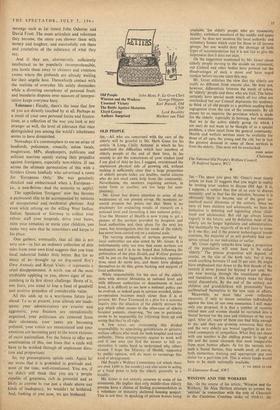SIR,—The space you gave Mr. Greer's most timely article on
June 21 suggests that you might in reality be inviting your readers to discuss Old Age. It is, I suppose, a subject that few of us care to discuss minutely; and in that lies the paradox, because it is obviously likely to become one of the great un- resolved social dilemmas of the century. Since we have all been children and adolescents, we have no hesitation in debating and legislating about child- hood and adolescence. But old age always looms vaguely in the future; and by definition most of the elderly are no longer legislators and administrators. Yet statistically the majority of us will have to come to it one day; and if the present technological trends continue, the majority of us will probably find our- selves retired in our mid-sixties or earlier.
Mr. Greer rightly remarks how large a proportion of the population will soon have to be called 'elderly.' The precise proportion will depend, of course, on the size of the birth rate; but it may reach anything between 15 and 20 per cent. He might have emphasised that down to the first decade of the century it never Passed far beyond 4 per cent: We are now moving through the transitional phase: and transitions of this kind always make for deep social discomforts. By the end of the century our children and grandchildren will presumably have acclimatised themselves to the new state of affairs.
Meanwhile, we must take some collective measures, if only to insure ourselves individually against the time of our own senescence. I will make only one proposal. It is that a number of recently retired men and women should be recruited into a Social Service for the care and visitation of the very aged. After all, many of them can find little enough to do; and they are growing conscious that they and the very elderly are bound together in an iso- lated commtmity of sympathies. What they can share with one another is Pie abiding power to laugh at life and the comic elements that seem inseparable from most human affairs. As for the recruits into such a Social Service,- they would need, of course, both elementary training and appropriate pay and status for a part-time job. This is where funds would have to be made nationally available.






































 Previous page
Previous page